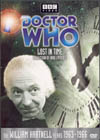Like "Galaxy Four" (story no. 18), this is a moral sci-fi story and manages to pack power into all of its dramatic, thematic, and action elements. The resolution is even smoother, as it has the distinction of being one of a group of very select few Doctor Who stories in which not a single character dies. That's right. You can have your cake and eat it too. Methods aside, considering the aims of the antagonists, it is all quite logical. In the end, even the characters we have grown to dislike also have their rightful, useful place, and Ian Stuart Black is to be greatly commended for this, and also for lacing the plot with good examples of moral thoughtfulness and courage all the way through (unlike "The Ark" [story no. 23] which saves all its morality for a rush-through at the very end). This script knows what its strengths are from beginning to end, and focuses on them accordingly.
The Doctor's pride, curiosity, and maturity shine in the opening episode, while his discretion gives way to courage as he takes his moral stand in episode two. The scene is virtually the same as the best one in "The Forest of Fear" (episode 3 of story no. 1: "An Unearthly Child"), only by now the Doctor's character has turned a complete 180 degrees. He's absorbed Barbara's good qualities and taken over the role she played in "Forest of Fear", and completed his transformation into the people's hero. William Hartnell seems to have had an uninteresting acting role in the third episode, as well as the beginning of the fourth, however, his Doctor is still present in mysterious ways..... Steven takes over much of the action in the latter two episodes, and quite rightly as this is his finale. Although it is the Doctor's presence that ultimately makes the difference to this society, turning their dystopia (a utopia that really isn't) into the real thing, Steven plays a commanding role in continuing to gain the trust of the sympathetic "Savages", something he will uphold in his unfolding new career on the planet. Dodo also has a crucial role of discovery in this story, and it is probably the best use of her character yet on the series. I particularly like the foreknowledge at work between both the Doctor and the Elders of the city, for both their meeting and the flavour of the result, while the details of how it will work out remain a mystery until everything plays out. This is something I would expect from truly advanced people for my own reasons. The actual arrival of the TARDIS was unfortunately shifted into the previous story, which did it off screen on the cheap. At least the interior scene is imported into the beginning of this story, and it sounds as if there's a good dematerialization at the end of the story. The TARDIS also remains an integral story location, in constant reference even if not as much of a used set or prop. Christopher Barry seems to have directed the story well, at least in getting good acting performances from those involved. Frederick Jaeger, who later became a principal guest star in stories like "Planet of Evil" (story no. 81) and "The Invisible Enemy" (story no. 93), does well here as Jano, and although his imitation of William Hartnell's Doctor sounds a bit nasal to me, he otherwise gets the characterization and mannerisms satisfyingly right. Ewen Solon, who also later appears in "Planet of Evil", plays Chal here, and his tricky calls across the scrubland stay well within good taste, and are actually hauntingly good. Still, the presentation of the utopian aspects of this society seems to be a tad "wet" and cliché. Perhaps characters like Flower just aren't fleshed out enough to be three-dimensionally real. This is a minor point at any rate, since the story quickly builds on the travelers' suspicions and reveals much of the true situation before the first episode is finished. Sound effects for weapons fire also seem to be working better; significant short bursts of white noise signal initial firings, while a tingling whine continues from underneath for as long as the weapon remains on. What will really make or break this story, production-wise, is a satisfying visual effect for the guards' light-guns, which feature very heavily throughout. The credibility of any actor being caught in the guns' beams can be greatly influenced by the quality of the special effect that will interact with them. It's not too late to add some modern post-production, if recovered TV episodes are eventually discovered to need some badly! Barry's invention of the Daleks' negative beam effect, in affecting the entire frame, is not particularly to my liking, so I'm reserving some judgment until I can actually see what he did here. The narration on the CD suggests they might even be using flashlights (or "torches" as the British seem to like to call them). Raymond Jones, who also provided music for "The Romans" (story no. 12) the previous year, turns in another decent score, very classical and providing a mood similar to a good old-fashioned horror movie, although it feels a bit melodramatic in a few places. It's far more effective than the "full symphony orchestra" fiasco of "The Myth Makers" (story no. 20). The cliffhangers don't seem to have much "punch" to them this time around though, at least from listening to audio alone. Extra narration has been added to try to fill this gap.
A Holiday for the Doctor's Friends...?Now that Steven has finished his run, the time is right to bring up something else of notice. I've ranted and raved every time William Hartnell missed an episode for one reason or another. However, I have yet to discover a single episode in which Maureen O'Brien as Vicki, or Peter Purves as Steven have taken a holiday. "Mission to the Unknown" (the single episode story no. 19) doesn't really count for me, as this was produced as an extra, outside the bounds of their contracts, and it's not as if William Hartnell was on hand to cover for them. With so many lost recordings, and re-workings in the novelized forms, I could easily have missed something, but the lack of mention of their holidays anywhere in Who literature has me scratching my head, and further fueling my feeling of unfairness with the Doctor-less episodes. Holidays for the entire original cast, as well as those for companions in the Troughton era, are all easy enough to find. Does anyone know more about holidays for Vicki and Steven, or the nature of the actors' contracts? (Dodo only completes four solid stories anyway, so I'm not concerned about not finding any in-between holidays for Jackie Lane).
International Titles:Deutsch: (Die Wilden)Magyar: "A vadak"Français: (Les sauvages)Русский: "Дикари"Italiano: "I selvaggi"This story is not known to exist in its original format (4 black-and-white 25-minute TV episodes) in its entirety.
Comments on this article are welcome. You may contact the author from this page:
|






